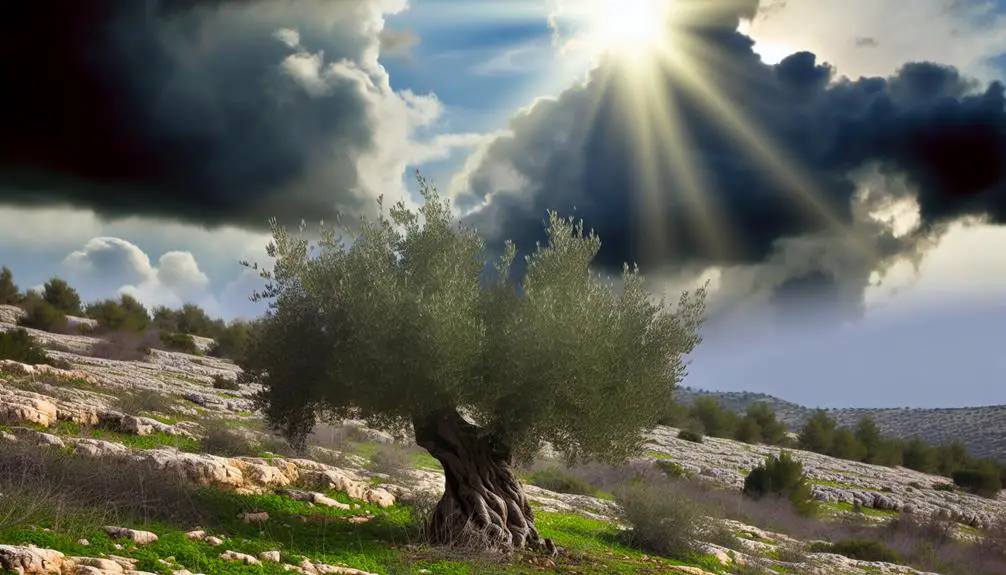Immerse yourself in the biblical significance of endurance to uncover how faith and patience intertwine in the spiritual journey.

Meaning of Endurance in the Bible
Did you know that the concept of endurance is mentioned over 120 times in various forms throughout the Bible? This statistic alone underscores its significance in the spiritual journey.
As you explore the depths of endurance, you'll discover it's not just about the capacity to withstand hardship but also involves a profound layer of faith, patience, and persistence that's deeply woven into the fabric of biblical teachings.
The heroes of faith weren't just figures of immense strength; they were embodiments of endurance in the face of trials. By reflecting on their stories, you're invited to uncover how this virtue can transform your own life, especially when navigating through challenges that seem insurmountable.
Key Takeaways
- Endurance in the Bible signifies steadfast perseverance in faith through trials and challenges.
- It is a cultivated virtue, essential for spiritual stamina and resilience.
- Biblical teachings link endurance with divine promises, offering motivation and strength to believers.
- Jesus' teachings emphasize enduring hardships with grace as a pathway to spiritual resilience.
Biblical Definition of Endurance

In the Bible, endurance is often depicted as the steadfast perseverance in faith and actions, despite facing trials and tribulations. This concept, deeply woven into the fabric of biblical teachings, serves as a foundational element for spiritual stamina. Through the use of vivid endurance metaphors, the scriptures provide a rich tapestry of insights into the nature of enduring faith.
You'll find that endurance in the biblical sense transcends mere patience; it's an active, dynamic quality that involves bearing hardships with a spirit of resilience and hope. The metaphor of the race, frequently employed in the New Testament, particularly exemplifies this. It's not just about reaching the finish line but doing so with diligence and determination, keeping one's eyes fixed on the prize of eternal life.
This spiritual stamina, then, isn't an inherent trait but a cultivated virtue, developed through the consistent practice of faith and good works. It's about holding fast to one's beliefs and values, even when the path becomes steep and the journey, long. In essence, the biblical definition of endurance encapsulates a proactive engagement with one's faith journey, marked by perseverance, resilience, and an unwavering commitment to spiritual growth.
Endurance Through Trials
Facing trials, believers are called to exhibit endurance, a virtue that tests one's faith and resilience in the midst of adversity. This endurance isn't a passive acceptance but an active, dynamic process of steadfastness under pressure. In the context of modern challenges—be they personal, societal, or global—this biblical concept of endurance takes on new dimensions. Personal resilience becomes the cornerstone of navigating these trials, reflecting a deep-rooted faith that, despite the external circumstances, there's a larger narrative at play, one that's divinely orchestrated.
Analyzing this from a scholarly perspective, the endurance mentioned in the Bible encapsulates a multifaceted approach to trials. It's not merely about surviving; it's about thriving spiritually, emotionally, and mentally. The trials you face aren't roadblocks to your faith but are, in fact, opportunities for growth. They serve to deepen your dependence on divine strength, rather than on human wisdom or might. In embracing this perspective, you align yourself with a historical lineage of believers who've seen trials not as a sign of divine abandonment, but as a stage for showcasing God's faithfulness and power in their lives.
Heroes of Faithful Endurance

You must consider the embodiments of faithful endurance as illustrated by Noah, Job, and Daniel within biblical narratives. Their stories aren't merely historical recounts but serve as profound lessons on the virtue of steadfast faith in the face of overwhelming adversities.
Analyzing their journeys reveals the intricate dynamics between divine promise and human persistence.
Noah's Unwavering Commitment
Amidst a world plunged into moral decay, Noah's unwavering commitment to righteousness stands as a beacon of faithful endurance within biblical narratives. His journey isn't just a testament to personal fortitude; it's a complex interweaving of animal parallels and architectural metaphors that enrich our understanding of endurance.
The ark, a monumental feat of divine architecture, symbolizes not merely survival, but the perseverance of faith through generations. Similarly, the gathering of animals, diverse yet unified in their purpose, mirrors the collective endurance required of humanity.
This narrative invites you to reflect on the essence of endurance, not as a solitary endeavor but as a communal, multifaceted undertaking, deeply rooted in faith and collective resilience.
Job's Perseverance Through Trials
Job's ordeal, a profound narrative of unwavering faith, showcases his perseverance through trials, marking him as a quintessential hero of faithful endurance. It's a testament to Job's integrity, even when faced with profound loss and unexplained suffering.
You see, Job's story isn't just about the anguish he endured; it's a deeply reflective exploration of suffering's purpose and the human capacity to maintain faith in the face of inexplicable adversity. Through Job, you're invited to ponder the rich tapestry of faith that doesn't falter under trial but grows deeper, more resilient.
His journey underscores a pivotal truth: genuine faith isn't proven by the absence of hardship but by enduring steadfastly through it, maintaining integrity against all odds.
Daniel's Steadfast Faith
Just as Job's narrative illuminates the profundity of faith under trial, Daniel's unwavering commitment in the lion's den exemplifies how steadfast belief can defy even the most perilous circumstances. Your reflection on Daniel's ordeal reveals not just a tale of survival, but a profound lesson on the resilience of faith. Through dream interpretation, Daniel demonstrated not only wisdom but an unshakeable trust in God, even when faced with death.
- The silence in the lion's den, a testament to divine protection.
- Daniel's calm amidst chaos, inspiring unwavering faith.
- The power of dream interpretation, bridging human and divine wisdom.
- The triumph over death, symbolizing faith's victory.
Analyzing Daniel's story, you're reminded that enduring faith can indeed alter the course of our own 'lion's dens,' guiding us towards a path of righteousness and divine trust.
Endurance and God's Promises

In exploring the concept of endurance within the biblical narrative, it's crucial to examine how it intertwines with the steadfast promises God offers to those who persevere. The scriptures are replete with instances where endurance isn't just encouraged but positioned as a prerequisite for receiving God's bountiful blessings. This alignment between endurance and divine favor manifests in two primary ways: promised rewards and divine strengthening.
Promised rewards are often depicted as the ultimate fulfillment of God's covenant with His people. These aren't merely temporal blessings but encompass eternal salvation, a place in God's kingdom, and unending joy. Such promises serve as a beacon, guiding believers through trials, ensuring them that their perseverance isn't in vain.
Simultaneously, divine strengthening is portrayed as a tangible manifestation of God's support during periods of endurance. This isn't a distant, passive promise but an active, present aid that enables believers to withstand trials beyond their natural capacity. It underscores the symbiotic relationship between divine provision and human perseverance, where enduring faith activates divine strength, ensuring that the believer is never alone in their trials.
Together, promised rewards and divine strengthening encapsulate the essence of endurance in the biblical context, offering both the motivation and means to persevere in faith.
The Role of Patience
Understanding the role of patience within the framework of biblical endurance reveals how it's fundamentally linked to spiritual growth and resilience. Patience isn't merely waiting; it's an active, vibrant part of one's faith journey, shaping how you navigate challenges and grow closer to God. Cultivating patience is an integral aspect of developing a robust spiritual life, necessitating reflection, prayer, and consistent practice.
The benefits of patience are profound, impacting not only your spiritual journey but also how you interact with the world and those around you. Here are several ways patience enriches your life:
- *Patience fosters a deeper understanding and appreciation for God's timing, not ours.*
- *It builds character, transforming trials into lessons of perseverance and hope.*
- *Patience enhances relationships, allowing for grace and understanding to flourish.*
- *It contributes to personal peace, reducing stress and promoting a thoughtful response over reactive emotions.*
Reflecting on these aspects, it's clear that patience isn't passive. It's a dynamic, powerful force in the believer's life, offering a pathway to enduring faith and unwavering trust in God's plan. Cultivating patience, therefore, isn't just beneficial; it's essential for anyone seeking to deepen their spiritual resilience and connection with the divine.
Endurance in Jesus' Teachings

In Jesus' teachings, you find a profound emphasis on enduring life's hardships with grace and resolve. He illustrates that perseverance through trials, faith amidst suffering, and love's unyielding nature aren't just virtues but essential elements for spiritual resilience.
Through his words, you're invited to reflect on how these principles can anchor you in times of turmoil, offering a pathway to transcendence and inner peace.
Perseverance Through Trials
Though trials may seem insurmountable, Jesus' teachings emphasize the importance of persevering through them as a foundational aspect of faith. This notion of endurance isn't just about passive waiting but involves active engagement with our challenges. It's about cultivating mental resilience and overcoming obstacles that life places in our path. In this light, Jesus' words offer profound wisdom on how to navigate the tumultuous waters of adversity.
- *Embrace trials as opportunities for growth.*
- *Lean into your faith as a source of strength and guidance.*
- *Recognize that overcoming obstacles builds character and deepens understanding.*
- *Find solace in the community and shared experiences.*
This reflective approach invites you to view trials not as deterrents but as catalysts for personal and spiritual development.
Faith Amidst Suffering
Building on the concept of persevering through trials, let's explore how enduring faith amidst suffering forms a core principle in Jesus' teachings, guiding us toward a deeper, more resilient spiritual life.
Modern Challenges |
Resilience Strategies |
|---|---|
Economic hardships |
Trusting in providence |
Health crises |
Seeking solace in prayer |
Social injustices |
Finding strength in community |
Personal loss |
Embracing hope beyond grief |
Emotional turmoil |
Cultivating inner peace |
Jesus' message encourages you to face life's adversities not as insurmountable obstacles, but as opportunities to deepen your faith and resilience. By embracing these resilience strategies, you're equipped to navigate modern challenges with a spirit not just of survival, but of profound transformation.
Love's Unyielding Nature
Delving into Jesus' teachings, we uncover that the essence of love's endurance serves as a foundational pillar, guiding believers through life's tumultuous waves with unwavering resilience. This endurance isn't merely about withstanding; it's about manifesting enduring patience and resilient hope that transforms challenges into opportunities for growth and deepening of faith.
- Enduring patience teaches you to embrace life's delays and difficulties with grace.
- Resilient hope ensures that despite the darkest nights, dawn will break.
The power of forgiveness showcases love's strength to heal and rebuild.
Unconditional acceptance exemplifies love's capacity to endure beyond faults and failings.
Analyzing Jesus' parables and sermons, we find these qualities not as abstract ideals but as actionable virtues, embodying love's unyielding nature.
Cultivating Endurance in Life

Cultivating endurance in life requires a deliberate and focused approach, embodying patience and resilience in the face of challenges. It's not merely about persisting through difficulty but growing stronger and more capable because of it. This process begins with endurance training and resilience building, essential components in developing a steadfast spirit. Endurance training in this context involves regularly facing challenges that stretch your limits, not to the point of breaking, but to foster growth and adaptation. It's akin to a muscle that, when exercised, becomes stronger over time.
Resilience building complements this by equipping you with the mental and emotional tools necessary to recover from setbacks. It's about developing a mindset that views obstacles as opportunities for learning rather than insurmountable barriers. This perspective shift is crucial; it instills a sense of hope and determination that's vital for enduring life's trials.
Reflect on your journey thus far, recognizing the moments of hardship as opportunities that have shaped your character. It's in these moments that endurance is both tested and fortified. By embracing this dual process of endurance training and resilience building, you're not just surviving life's storms but learning to thrive amidst them.
Frequently Asked Questions
How Has the Interpretation of Endurance in the Bible Evolved Over Different Historical Periods and Within Various Christian Denominations?
You're exploring how the concept of endurance has shifted through time and across Christian sects. With translation variations and different historical contexts, it's clear that interpretations have evolved significantly.
Analyzing texts and teachings, you'll find that some denominations emphasize perseverance in faith under trial, while others highlight enduring in service or moral integrity. Reflecting on these changes offers you a deeper understanding of the dynamic nature of religious interpretation.
Can Biblical Teachings on Endurance Be Reconciled With Modern Psychological Understandings of Resilience and Mental Health?
Navigating life's storms, you might wonder if ancient wisdom on endurance meshes with today's science on resilience. Neuroscience research illuminates how stress management techniques and psychological resilience are cornerstone concepts in mental health.
Analyzing biblical teachings through this lens, you'll find a surprising harmony. The scriptures' call to endure can indeed align with modern understandings of mental fortitude, suggesting a bridge between spiritual perseverance and psychological resilience.
How Do Non-Christian Religions and Philosophies View the Concept of Endurance in Comparison to the Biblical Perspective?
You're exploring how non-Christian beliefs approach endurance. Buddhist patience emphasizes calmness in suffering, contrasting with the proactive endurance found in the Bible.
Islamic perseverance, or Sabr, shares similarities, focusing on steadfastness amidst trials, akin to biblical teachings but with distinct spiritual underpinnings.
This inquiry reveals that while the core value of enduring hardship is universal, the philosophical and religious contexts shape its interpretation and application in uniquely meaningful ways.
In What Ways Has the Theme of Endurance in the Bible Influenced Contemporary Christian Music, Art, and Literature?
You'll find that the theme of endurance weaves through Christian music, art, and literature, painting vivid images of perseverance and faith. Endurance metaphors shape lyrical ballads and gospel anthems, echoing across various musical genres.
This motif not only adorns canvases but also enriches narratives, offering a reflective lens on human resilience. Through these expressions, the concept deeply influences contemporary Christian culture, inviting audiences to explore endurance's multifaceted significance in their spiritual journey.
Are There Any Notable Differences in the Emphasis on Endurance Between the Old Testament and the New Testament, Beyond the Specific Sections Covered in the Article?
You're exploring how the emphasis on endurance shifts between the Old and New Testaments, looking beyond the article's scope. This inquiry uncovers covenant differences, highlighting how endurance's role evolves.
In the Old Testament, endurance is often tied to prophetic illustrations, reflecting a covenant of law and obedience.
Conversely, the New Testament frames endurance within the covenant of grace, emphasizing perseverance through faith.
This distinction offers a nuanced understanding of biblical endurance.
Conclusion
In your journey through scripture, you've encountered the profound essence of endurance, woven like a thread through the fabric of biblical narratives. Coincidentally, this endurance mirrors the resilience required in your own life. Reflecting on the steadfastness of biblical heroes and the teachings of Jesus, you're reminded that enduring faith isn't merely about withstanding trials but about embracing God's promises with patience.
Cultivating such endurance transforms challenges into opportunities for growth, echoing the timeless wisdom that faith, tested by time, becomes unshakeable.



Sign up